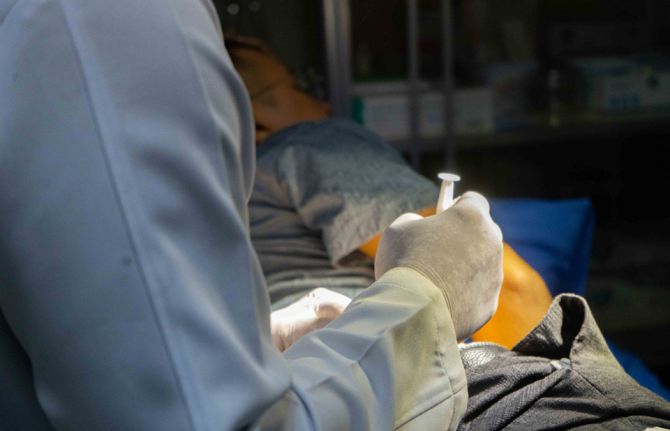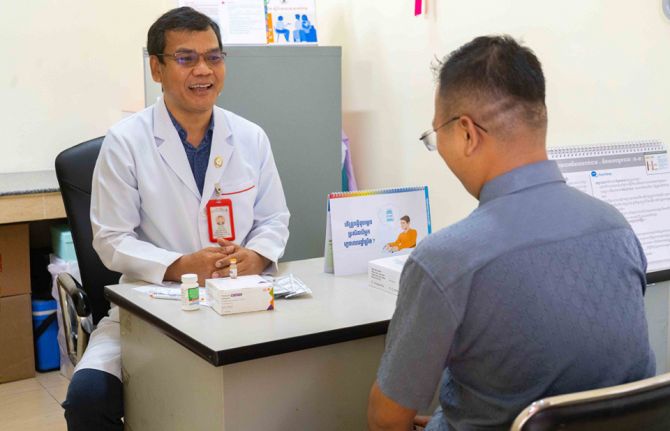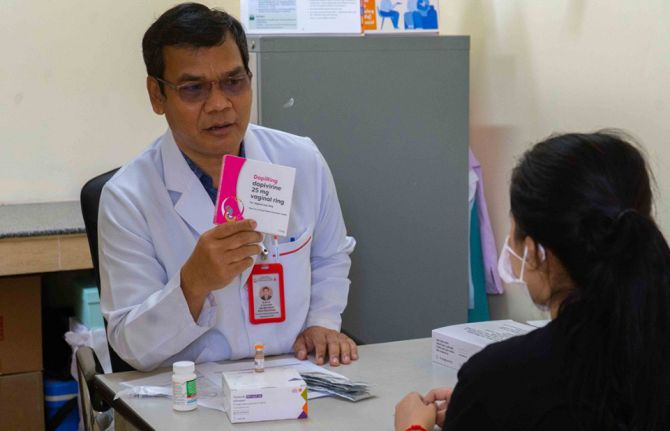




Feature Story
Cambodia becomes the second country in the Asia Pacific to offer long-acting PrEP
04 July 2025
04 July 2025 04 July 2025Borey and Sophea have both used PrEP—a medicine taken every day to avoid contracting HIV. But while this solution has worked, it was not a perfect fit.
Due to his active professional and personal life, Borey sometimes forgot to pack his pills.
“This makes it easy to miss doses, especially when I have unplanned sexual encounters,” he said.
Sophea, a female entertainment worker, is more concerned about her HIV risk with her intimate partner than at work where she uses condoms.
“I don’t fully trust that he is monogamous… he may have other partners. So, it is important for me to protect myself,” she explained.
Still, she says she’s become tired of taking a pill every day for the last six months.
Borey and Sophia are among the first clients in Cambodia to begin long-acting injectable Cabotegravir (CAB-LA), a PrEP formulation administered every two months. With this initiative, Cambodia has become a frontrunner in the Asia Pacific region to roll out long-acting PrEP.
This HIV prevention tool is aimed primarily at groups of key populations at higher risk of HIV infection including men who have sex with men, transgender women, female entertainment workers, people who inject drugs, and couples with one HIV-positive and one HIV-negative partner. This solution is being prioritized for individuals who face challenges with daily pill adherence, those with frequent risk exposure, and those who prefer a more discrete prevention method.
“Offering multiple PrEP options enhances our ability to meet the diverse needs of individuals at risk of HIV,” explained Ouk Vichea, Director of the National Center for HIV/AIDS Dermatology and STD (NCHADS). “Not everyone is comfortable with, or able to adhere, to a daily oral regimen. CAB-LA provides a long-acting alternative that can improve adherence and reduce stigma.”
Offering diverse and innovative HIV prevention solutions is a key strategy as Cambodia embarks on what it hopes is the final chapter towards ending AIDS as a public health threat. The country has made great progress, providing treatment to almost all people it diagnoses and achieving viral suppression among more than 98% of people on antiretroviral therapy.
However, HIV prevention remains a challenge. Every day three people are newly infected with HIV. Nine of every ten new infections occur among people from key population communities (88%). Almost half of new infections (44%) are among young people while 79% are among men.
As a young, gay man, Borey is aware of the risks and welcomes a solution he considers to be more user-friendly.
“With CAB-LA, I don’t have to worry about remembering to take a pill every day. It gives me peace of mind and helps me stay prepared and protected. It fits well with my lifestyle because I have multiple partners and don’t always feel trust. CAB-LA makes things easier, especially in situations where sex is unplanned,” he said.
NCHADS ensures that counseling is client-centered and focuses on providing clear, non-judgmental information about all available PrEP options.
“We discuss the benefits, potential side effects, dosing schedules, and how each option fits into the client’s lifestyle. We also assess their risk profile, preferences, and any barriers they may face. The goal is to support informed decision-making and ensure clients feel confident and comfortable with their choice,” Mr Ouk said.
Patricia Ongpin, UNAIDS Country Director to Cambodia, Lao PDR and Malaysia stressed the importance of choice.
“We should present people with options and ask what fits their lives. When we pair people with suitable prevention solutions, they are more likely to be consistent,” she said.
NCHADS is exploring several innovative approaches to strengthen HIV prevention. One key development is the upcoming launch of the dapivirine vaginal ring-PrEP (DVR-PrEP). This will offer women a long-acting prevention method they can control. Cambodia will be the first country in the region to make this option available.
In addition, the clinic will expand the use of digital tools for adherence support, and community-led delivery models to increase accessibility and trust. They continue to monitor advancements in next-generation PrEP products, including future injectable and implantable options, to ensure the most effective and client-centered prevention tools are available to the people who need them most.



